Résultats de recherche de titre
Articles 1489921 à 1489940 sur 1503314
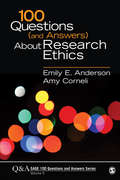
100 Questions (SAGE 100 Questions and Answers #5)
Par Emily E. Anderson, Amy L. Corneli. 2018
100 Questions (and Answers) About Research Ethics is an essential guide for graduate students and researchers in the social and…
behavioral sciences. It identifies ethical issues that individuals must consider when planning research studies as well as provides guidance on how to address ethical issues that might arise during research implementation. Questions such as assessing risks, to protecting privacy and vulnerable populations, obtaining informed consent, using technology including social media, negotiating the IRB process, and handling data ethically are covered. Acting as a resource for students developing their thesis and dissertation proposals and for junior faculty designing research, this book reflects the latest U.S. federal research regulations to take effect mostly in January 2018.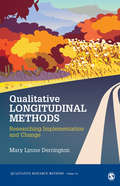
Qualitative Longitudinal Methods: Researching Implementation and Change (Qualitative Research Methods #54)
Par Mary L. Derrington. 2019
Mary Lynne Derrington’s Qualitative Longitudinal Methods: Researching Implementation and Change addresses the use of the qualitative longitudinal methods, their unique…
methodological features, and the challenges and benefits to this approach. This short supplemental text uses examples of published studies, and the author’s own stories and examples, to show application of the concepts. A chapter on how to prepare a manuscript for publication concentrates on the distinctive aspects of publishing longitudinal studies. The book will be useful to those researching change and its impact on organizations and individuals resulting from the implementation of programs and policies.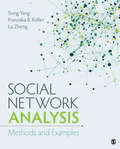
Social Network Analysis: Methods and Examples (Quantitative Applications In The Social Sciences Ser. #154)
Par Lu Zheng, Song Yang, Franziska B Keller. 2017
Social Network Analysis: Methods and Examples prepares social science students to conduct their own social network analysis (SNA) by covering…
basic methodological tools along with illustrative examples from various fields. This innovative book takes a conceptual rather than a mathematical approach as it discusses the connection between what SNA methods have to offer and how those methods are used in research design, data collection, and analysis. Four substantive applications chapters provide examples from politics, work and organizations, mental and physical health, and crime and terrorism studies.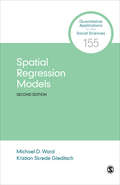
Spatial Regression Models: Spatial Regression Models (Quantitative Applications in the Social Sciences #155)
Par Kristian Skrede Gleditsch, Michael D. Ward. 2019
Spatial Regression Models illustrates the use of spatial analysis in the social sciences within a regression framework and is accessible…
to readers with no prior background in spatial analysis. The text covers different modeling-related topics for continuous dependent variables, including mapping data on spatial units, creating data from maps, analyzing exploratory spatial data, working with regression models that have spatially dependent regressors, and estimating regression models with spatially correlated error structures. Using social science examples based on real data, the authors illustrate the concepts discussed, and show how to obtain and interpret relevant results. The examples are presented along with the relevant code to replicate all the analysis using the R package for statistical computing. Users can download both the data and computer code to work through all the examples found in the text. New to the Second Edition is a chapter on mapping as data exploration and its role in the research process, updates to all chapters based on substantive and methodological work, as well as software updates, and information on estimation of time-series, cross-sectional spatial models.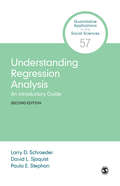
Understanding Regression Analysis: An Introductory Guide (Quantitative Applications in the Social Sciences #57)
Par Larry D. Schroeder, David L. Sjoquist, Paula E. Stephan. 2017
Understanding Regression Analysis: An Introductory Guide presents the fundamentals of regression analysis, from its meaning to uses, in a concise,…
easy-to-read, and non-technical style. It illustrates how regression coefficients are estimated, interpreted, and used in a variety of settings within the social sciences, business, law, and public policy. Packed with applied examples and using few equations, the book walks readers through elementary material using a verbal, intuitive interpretation of regression coefficients, associated statistics, and hypothesis tests. The Second Edition features updated examples and new references to modern software output.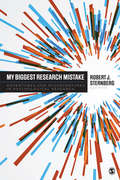
My Biggest Research Mistake: Adventures and Misadventures in Psychological Research
Par Robert J. Sternberg. 2020
My Biggest Research Mistake helps students and professionals in the field of psychological science learn from the diverse mistakes of…
successful psychological scientists. Through 57 personal stories drawn from the experiences of fellows in the Association for Psychological Science (APS), editor Robert J. Sternberg presents the mistakes of experts in the field as opportunities for learning, allowing students to avoid making the same mistakes in their own work.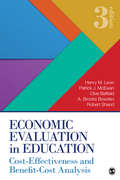
Economic Evaluation in Education: Cost-Effectiveness and Benefit-Cost Analysis
Par Henry M. Levin, Patrick J. McEwan, Clive R. Belfield, A. Brooks Bowden, Robert D. Shand. 2018
The past decade has seen increased attention to cost-effectiveness and benefit-cost analysis in education as administrators are being asked to…
accomplish more with the same or even fewer resources, philanthropists are keen to calculate their "return on investment" in social programs, and the general public is increasingly scrutinizing how resources are allocated to schools and colleges. This text (titled Cost-Effectiveness Analysis in its previous editions) is the only full-length book to provide readers with the step-by-step methods they need to plan and implement a benefit-cost analysis in education. The authors examine a range of issues, including how to identify, measure, and distribute costs; how to measure effectiveness, utility, and benefits; and how to incorporate cost evaluations into the decision-making process. The updates to the Third Edition reflect the considerable methodological development in the evaluation literature, and the greater empiricism practiced by education researchers, to help readers learn to apply more advanced methods to their own analyses. SAGE congratulates author Henry M. Levin, winner of the 2017 AERA Distinguished Contributions to Research in Education Award.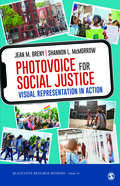
Photovoice for Social Justice: Visual Representation in Action (Qualitative Research Methods)
Par Jean M. Breny, Shannon L. McMorrow. 2021
Photovoice for Social Justice, the latest volume in SAGE′s Qualitative Research Methods Series, helps readers in the health and social sciences learn…
the foundations and applications of this exciting qualitative method. Authors Jean M. Breny and Shannon L. McMorrow approach photovoice as not only a community-based participatory research method, but as a method for social justice, centering community participants, organizations, and policy makers at the heart of this research method. Special topics relating to social justice include a focus on ethics and working with marginalized communities, sensitive concerns during data collection, and presenting the work to communities and policymakers, as well as academics. Written for students and researchers new to photovoice, this brief text takes readers from the process of conceptualizing and implementing a photovoice study to analyzing data and finally presenting the results of the study. The book concludes with suggestions for future iterations of photovoice, including web based resources and digital storytelling. The authors take into account the realities of photovoice as a method by providing practical, applied tools including sample consent forms, presentations, recruitment flyers, and photo-taking tips. Using Photovoice for Social Justice, new and experienced researchers can design, implement, and analyze their photovoice projects.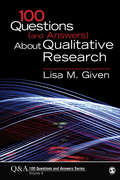
100 Questions (SAGE 100 Questions and Answers)
Par Lisa M. Given. 2016
Exploring 100 key questions (and answers) on the nature and practice of qualitative inquiry, this unique book addresses the practical…
decisions that researchers must make in their work, from the design of the study, through ethics approval, implementation, and writing. The book’s quick-scan, question-and-answer format make it ideal as a supplementary text or as a ready reference for graduate students preparing for comprehensive exams and writing research proposals, undergraduates in affiliated programs who will not be taking a primary course in qualitative research methods, and researchers working across disciplines in academic or practice environments.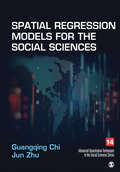
Spatial Regression Models for the Social Sciences (Advanced Quantitative Techniques in the Social Sciences #14)
Par Jun Zhu, Guangqing Chi. 2020
Spatial Regression Models for the Social Sciences shows researchers and students how to work with spatial data without the need…
for advanced mathematical statistics. Focusing on the methods that are commonly used by social scientists, Guangqing Chi and Jun Zhu explain what each method is and when and how to apply it by connecting it to social science research topics. Throughout the book they use the same social science example to demonstrate applications of each method and what the results can tell us.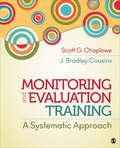
Monitoring and Evaluation Training: A Systematic Approach
Par J. Bradley Cousins, Scott G. Chaplowe. 2016
This one-of-a-kind book fills a gap in the literature by providing readers with a systematic approach to monitoring and evaluation…
(M&E) training for programs and projects. Bridging theoretical concepts with practical, how-to knowledge, authors Scott Chaplowe and J. Bradley Cousins draw upon the scholarly literature, applied resources, and over 50 years of combined experience to provide expert guidance that can be tailored to different M&E training needs and contexts, including those for novices, professionals, organizations and their staff, community members, and other groups with a desire to learn and sustain sound M&E practices.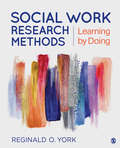
Social Work Research Methods: Learning by Doing
Par Reginald O. York. 2020
Social Work Research Methods is a step-by-step journey through the process of conducting research. With over 30 years of teaching…
experience, author Reginald O. York helps readers discover how research can enable them to better serve clients in the field. Each chapter features a hands-on approach to producing research, with practical chapter exercises that reinforce methods mastery. Using their own data, students engage in realistic research activities and gain an appreciation for science-informed practice as a means of evaluating client outcomes.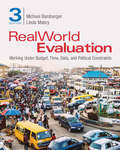
RealWorld Evaluation: Working Under Budget, Time, Data, and Political Constraints
Par Linda S. Mabry, J. Michael Bamberger. 2020
RealWorld Evaluation: Working Under Budget, Time, Data, and Political Constraints addresses the challenges of conducting program evaluations in real-world contexts…
where evaluators and their clients face budget and time constraints. The book is organized around the authors’ seven-step model that has been tested in workshops and practice environments to help the evaluation implementers and managers make the best choices when faced with real world constraints. The Third Edition includes a new chapter on gender equality and women’s empowerment and discussion of digital technology and data science.
Understanding Regression Analysis: An Introductory Guide (Quantitative Applications in the Social Sciences #57)
Par Larry D. Schroeder, David L. Sjoquist, Paula E. Stephan. 2017
Understanding Regression Analysis: An Introductory Guide presents the fundamentals of regression analysis, from its meaning to uses, in a concise,…
easy-to-read, and non-technical style. It illustrates how regression coefficients are estimated, interpreted, and used in a variety of settings within the social sciences, business, law, and public policy. Packed with applied examples and using few equations, the book walks readers through elementary material using a verbal, intuitive interpretation of regression coefficients, associated statistics, and hypothesis tests. The Second Edition features updated examples and new references to modern software output.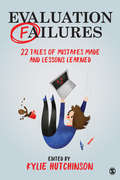
Evaluation Failures: 22 Tales of Mistakes Made and Lessons Learned
Par Kylie Hutchinson. 2019
"This is the evaluation book we′ve been waiting for! A must-read for all learning and working in the field." –Amanda…
M. Olejarski, West Chester University Evaluation Failures: 22 Tales of Mistakes Made and Lessons Learned is a candid collection of stories from seasoned evaluators from a variety of sectors sharing professional mistakes they have made in the past, and what they learned moving forward. As the only book of its kind, editor Kylie Hutchinson has collected a series of engaging, real-life examples that are both entertaining and informative. Each story offers universal lessons as takeaways, and discussion questions for reflective practice. The book is the perfect companion to anyone working in the evaluation field, and to instructors of program evaluation courses who want to bring the real world into their classroom.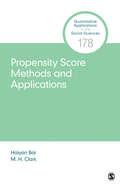
Propensity Score Methods and Applications (Quantitative Applications in the Social Sciences #178)
Par Haiyan Bai, M. H. Clark. 2019
A concise, introductory text, Propensity Score Methods and Applications describes propensity score methods (PSM) and how they are used to…
balance the distributions of observed covariates between treatment conditions as a means to reduce selection bias. This new QASS title specifically focuses on the procedures of implementing PSM for research in social sciences, instead of merely demonstrating the effectiveness of the method. Using succinct and approachable language to introduce the basic concepts of PSM, authors Haiyan Bai and M. H. Clark present basic concepts, assumptions, procedures, available software packages, and step-by-step examples for implementing PSM using real-world data, with exercises at the end of each chapter allowing readers to replicate examples on their own.
100 Questions (SAGE 100 Questions and Answers #5)
Par Emily E. Anderson, Amy L. Corneli. 2018
100 Questions (and Answers) About Research Ethics is an essential guide for graduate students and researchers in the social and…
behavioral sciences. It identifies ethical issues that individuals must consider when planning research studies as well as provides guidance on how to address ethical issues that might arise during research implementation. Questions such as assessing risks, to protecting privacy and vulnerable populations, obtaining informed consent, using technology including social media, negotiating the IRB process, and handling data ethically are covered. Acting as a resource for students developing their thesis and dissertation proposals and for junior faculty designing research, this book reflects the latest U.S. federal research regulations to take effect mostly in January 2018.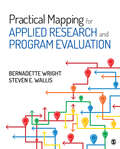
Practical Mapping for Applied Research and Program Evaluation
Par Bernadette M. Wright, Steven E. Wallis. 2020
Practical Mapping for Applied Research and Program Evaluation is the first book to bring the mapping methodology to social research…
and program evaluation. Bernadette Wright and Steven E. Wallis guide readers through all phases of the research process: learning from stakeholder experience; reviewing existing knowledge in the field; conducting new data collection such as interviews; collaborating with other researchers; and facilitating the use of knowledge for communication, collaboration, and action. With plenty of illustrations and navigational aids such as "travel tips," the book is an accessible guide for busy students, researchers, and managers of all levels of experience.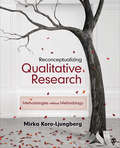
Reconceptualizing Qualitative Research: Methodologies without Methodology
Par Mirka Koro. 2016
Calling for qualitative research that is complex, situational, theoretically situated, and yet productive, Reconceptualizing Qualitative Research discusses the multiplicities and…
uncertainty embedded in different methodological configurations and entanglements that blur the boundaries between doing research, theorizing, thinking, and reflecting. Writing in a clear, conversational style, author Mirka Koro-Ljungberg urges readers to think about qualitative research differently, often in creative ways, and to continuously question existing grand narratives and dogmas.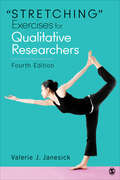
"Stretching" Exercises for Qualitative Researchers
Par Valerie J. Janesick. 2016
In the new Fourth Edition of her inventive, one-of-a-kind book, author Valerie J. Janesick uses dance, yoga, and meditation metaphors…
to help researchers tap into the intuitive and creative side of their research. In every chapter, "stretching" exercises help readers develop, practice, and hone fieldwork skills and vital habits of mind such as observation, interviewing, writing, creativity, technology, and analysis. While reading the book and working through the exercises, readers can complete a researcher’s reflective journal—an invaluable tool that will remain useful throughout their careers.